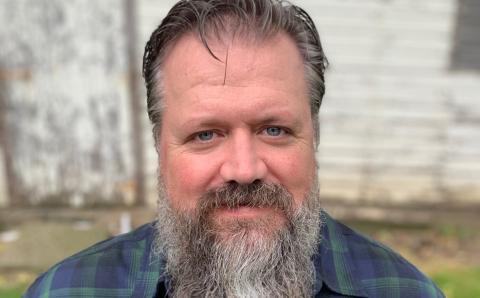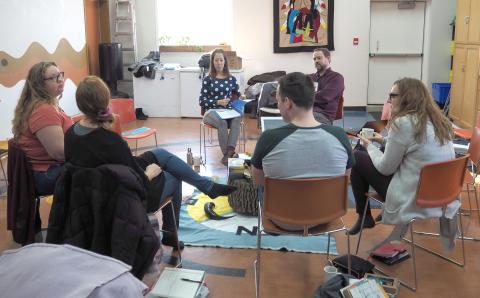For quite some time, “finding my purpose” in life gave me a lot of anxiety. But I’ve recently come to the conclusion that the anxiety is caused by how I’ve been thinking about purpose: the same way I used to think about romantic relationships and the myth of “the one.”
The myth of “the one” says the universe has picked out one special person for you, a soulmate perfectly crafted to meet your every need and fit your every curve of character. All you have to do is find that person!
This mentality is similar to the idea of finding one specific purpose meant only for you. It raises the stress level of teens, young adults, and even those in their later years. “The universe has specially crafted a purpose for you! A career, a purposeful path, that fits your every curve of character! All you have to do is find it!”
To raise that level of stress a bit more, look at online search results for books related to purpose. Many are based on the premise that if you want to live any semblance of a satisfied life, you must discover your purpose. If you don’t, you will live a meaningless, directionless, disappointing life as your true, good, and purpose-driven life passes you by.
To make things even worse, it sometimes seems as if everyone else is already living a purpose-driven life. I recently spoke with a friend who is a mom in her 40s. She has spent the last 20 years taking care of, feeding, and raising her family, but now her children no longer need the same level of care. Now what? As I tried to offer her an encouraging word, she cut me off, pointed her finger at my chest and said, “It’s easy for you; you’ve always known what your purpose is in life!”
That’s not true. But I understand why she felt that way. We sometimes feel as if we MUST find our specially crafted, universe-honed, life-giving purpose, and if we don’t our lives will pass us by.
That feeling drives midlife crises. It drives crashes in people’s higher education or careers. It drives a lot of stress in a lot of people all asking the same questions: “Why on earth am I on Earth? What am I supposed to do with my life?”
I think the apostle Paul has some helpful words for those of us wondering about that. In one of his letters, to Christians living in Rome, Paul says this:
“Therefore, I urge you, brothers and sisters, in view of God’s mercy, to offer your bodies as a living sacrifice, holy and pleasing to God—this is your true and proper worship. Do not conform to the pattern of this world, but be transformed by the renewing of your mind. Then you will be able to test and approve what God’s will is—his good, pleasing and perfect will” (Rom. 12:1-2).
And in his letter to Colossians, Paul writes, “Whatever you do, whether in word or deed, do it all in the name of the Lord Jesus” (Col. 3:17).
In other words, purpose has far more to do with how than what. What you do with your life is far less important than how you do it!
Purpose, then, can be described in these three ways:
Your purpose in life is a response.
Your purpose in life is a renunciation.
Your purpose in life is to replicate a reputation.
First, our purpose in whatever we do is to respond to God’s mercy in our lives. Paul says in Romans 12 that we should live our lives “in view of God’s mercy.” In other words, everything you do should be in response to the mercy God has shown you. Whether you are a parent, a teacher, a construction technician, a farmer, a father, a mother—whatever you do, you should do it in response to God’s mercy. This is a surprising idea for Paul’s readers. Typically they made sacrifices and offerings in order to get something from the gods, not to do something for the gods in response to a previous action. They made offerings to procure forgiveness, a good harvest, health, a successful hunt, a fortunate business transaction. But Paul tells them to offer their lives in view of God’s mercy already given. Our purpose is to respond to God’s mercy.
Secondly, our purpose is a renunciation. Paul uses the language of self-sacrifice. Your purpose in life is not to sacrifice for personal success. Your purpose in life is not to sacrifice for self-fulfillment. Your purpose is to renounce yourself and offer your life for others. The pattern for offering one’s life was set by Jesus, who “did not come to be served, but to serve” (Matt. 20:28). Likewise, your purpose in life is to renounce yourself and to offer your life in service to others.
Finally, our purpose is to replicate a reputation. Paul says that whatever you do (notice he doesn’t seem to care too much about the “what”), do it in the name of the Lord Jesus. This sounds odd; we don’t often do anything in someone’s name anymore. But what Paul means by “name” is a reputation. Whatever you do, do it as though Jesus’ reputation is going to be attached to it. Your purpose is to replicate Jesus’ reputation. If people look at how you’re living your life, do they see Jesus?
When you find yourself wondering, “Why on earth am I on Earth?”—when it becomes a stressful, paralyzing question—start asking yourself instead, “Where I am right now? How can I live in response to God’s mercy? Whom can I serve? Does this add to the positive reputation of Jesus?” Your purpose has far less to do with what than how. The what will change with life’s changing seasons, but the how never does. The rest will work itself out in time.
Discussion Questions:
- How do you answer or have you answered the question of your “purpose” in life?
- How does refocusing from “what” to “how” help us?
- What difference does living one’s life as a response to God’s mercy make?
- What do you think is Christ’s current reputation in our North American society due to Christians’ lives and actions?
About the Author
Corey Van Huizen was the founding pastor of The Gathering, a church plant in Caledonia, Mich. He and his wife, Alanna, love all things on, in, or near water.






